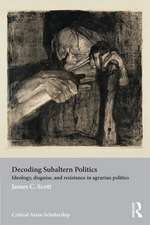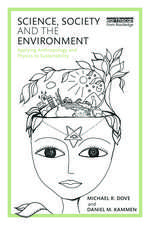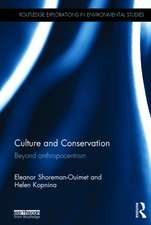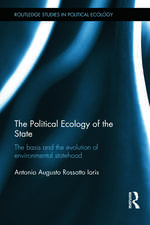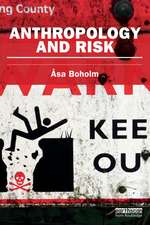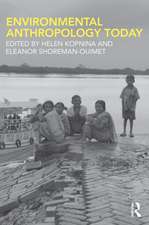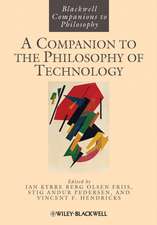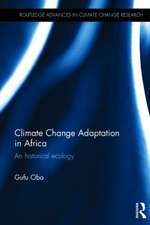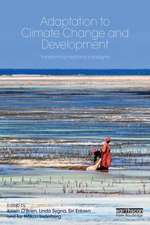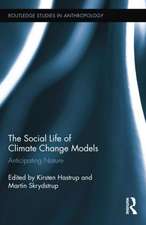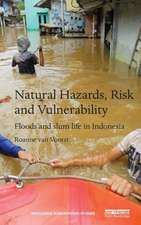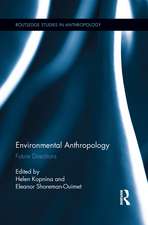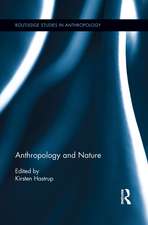Animal Housing and Human-Animal Relations: Politics, Practices and Infrastructures: Routledge Human-Animal Studies Series
Editat de Kristian Bjørkdahl, Tone Druglitrøen Limba Engleză Hardback – 17 mai 2016
This book provides an in-depth investigation into the practices of animal housing systems with international contributions from across the humanities and social sciences. By attending to a range of different sites such as the zoo, the laboratory, the farm and the animal shelter, to name a few, the book explores material technologies from the perspective that these are integrated parts of a larger biopolitical infrastructure and questions how animal housing systems, and the physical infrastructures that surround central human-animal practices, come into being. The contributions in the book show in various ways how physical infrastructures of animal housing are always part of a much broader sociocultural and political infrastructure, where the material reality of housing systems combines with human and animal agents, with politics, and with practices. As such, the book explores what kind of practices and relations develop around the physical structures of animal housing, and by whom, and for whom, they are developed. This innovative collection will be of great interest to student and scholars in animal studies, more than human studies, geography, anthropology, and sociology."
| Toate formatele și edițiile | Preț | Express |
|---|---|---|
| Paperback (1) | 312.43 lei 6-8 săpt. | |
| Taylor & Francis – 6 feb 2018 | 312.43 lei 6-8 săpt. | |
| Hardback (1) | 764.62 lei 6-8 săpt. | |
| Taylor & Francis – 17 mai 2016 | 764.62 lei 6-8 săpt. |
Din seria Routledge Human-Animal Studies Series
-
 Preț: 310.09 lei
Preț: 310.09 lei -
 Preț: 326.14 lei
Preț: 326.14 lei -
 Preț: 312.09 lei
Preț: 312.09 lei -
 Preț: 311.06 lei
Preț: 311.06 lei -
 Preț: 444.62 lei
Preț: 444.62 lei -
 Preț: 479.63 lei
Preț: 479.63 lei - 14%
 Preț: 312.43 lei
Preț: 312.43 lei -
 Preț: 416.22 lei
Preț: 416.22 lei -
 Preț: 416.22 lei
Preț: 416.22 lei -
 Preț: 382.27 lei
Preț: 382.27 lei -
 Preț: 383.93 lei
Preț: 383.93 lei -
 Preț: 384.59 lei
Preț: 384.59 lei -
 Preț: 389.66 lei
Preț: 389.66 lei -
 Preț: 380.07 lei
Preț: 380.07 lei -
 Preț: 381.51 lei
Preț: 381.51 lei - 18%
 Preț: 1000.76 lei
Preț: 1000.76 lei - 9%
 Preț: 937.51 lei
Preț: 937.51 lei
Preț: 764.62 lei
Preț vechi: 1103.04 lei
-31% Nou
146.33€ • 152.20$ • 120.80£
Carte tipărită la comandă
Livrare economică 15-29 aprilie
Specificații
ISBN-10: 1138854115
Pagini: 228
Ilustrații: 48
Dimensiuni: 156 x 234 x 19 mm
Greutate: 0.48 kg
Ediția:1
Editura: Taylor & Francis
Colecția Routledge
Seria Routledge Human-Animal Studies Series
Locul publicării:Oxford, United Kingdom
Public țintă
Postgraduate and UndergraduateCuprins
2. The Salmon Domus as a Site of Mediation
3. What is a Cow? The Invention of the Freestall and How Cows Lost Their Horns
4. When the Battery Cage Came to Norway: The Historical Path of an Agro-Industrial Artifact
5. Back to Nature! Rehabilitating Danish Research Monkeys
6. Housing Eiders – Making Heritage: The Changing Context of the Human-Eider Relationship in the Vega Archipelago, Norway
7. Muscox in a Box and Other Tales of Containers as Domesticating Mediators in Animal Relocation
8. How Much is that Doggy in the Window? The Aesthetics of Shelter Animal Display
9. Concrete Kingdoms: Heini Hediger’s Territories at the Zurich Zoo
10. Care and Tinkering in the Animal House: Conditioning Monkeys for Poliomyelitis Research and Public Health Work
11. Care in the Cage: Materializing Moral Economies of Animal Care in the Biomedical Sciences, c. 1945-
12. The Spatial Arrangements of Making Research Piglets into Resources for Translational Medicine
13. Closing the Barn Door
Notă biografică
Tone Druglitrø is a Post-Doctoral Research Fellow at TIK Centre for Technology, Innovation and Culture, University of Oslo, Norway.
Descriere
This book provides an in-depth investigation into the practices of animal housing systems with international contributions from across the humanities and social sciences. By attending to a range of different sites such as the zoo, the laboratory, the farm and the animal shelter, to name a few, the book explores material technologies from the perspective that these are integrated parts of a larger biopolitical infrastructure and questions how animal housing systems, and the physical infrastructures that surround central human-animal practices, come into being. The contributions in the book show in various ways how physical infrastructures of animal housing are always part of a much broader sociocultural and political infrastructure, where the material reality of housing systems combines with human and animal agents, with politics, and with practices. As such, the book explores what kind of practices and relations develop around the physical structures of animal housing, and by whom, and for whom, they are developed. This innovative collection will be of great interest to student and scholars in animal studies, more than human studies, geography, anthropology, and sociology."



